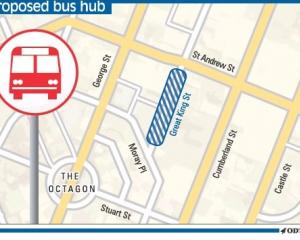Port Otago is to shed up to 35 jobs in response to an expected loss of 40,000 container movements in the coming year.
Two-thirds of those losing their jobs will be cargo handlers.
The balance will be supervisors and management, with workers initially invited to take voluntary redundancy before staff are made redundant.
The port employs about 320 workers, of which about 230 are cargo handlers.
Port management estimated the loss of cargo trade would cost it $4 million in revenue.
Maritime Union of New Zealand Port Chalmers secretary Phil Adams said it was the sixth round of redundancies at the port since 1989.
Staff were stressed and upset about the latest job losses, but all were confident of the port's future.
"This port will survive.
"It is going through a hiccup at the moment," Mr Adams said.
Port Otago chief executive Geoff Plunket was also optimistic about the future, even though this year's expected traffic of 180,000 container movements would be about 40,000 down on last year's total.
The bulk of the decline was because Fonterra had stopped transhipping containers from New Plymouth and Timaru through Port Otago.
Those containers were stored and reloaded on to direct shipping services but would now be railed and sent through the ports of Lyttelton, Napier, Tauranga and Auckland.
Mr Plunket said the loss of transhipped container traffic added to a general downturn in shipping which followed years of rapid growth, during which container traffic grew from 35,000 in the mid-1990s to a record 218,000 last year.
"The combined impact of shipping-line consolidation, supply chain changes by major exporters and a downturn in the global economy is being felt across the sector," he said.
Efforts to reduce the impact of the redundancies by holding discussions with the Maritime Union of New Zealand and the Rail and Maritime Transport Union were not successful, he said.
"Regrettably, the consultation process ended without the company being able to make tangible steps towards a more flexible workforce structure, leaving it with no option but to make today's announcement, a step that has not been required since the mid-1990s."
Mr Plunket said major capital expenditure had come to an end, but Port Otago would still seek resource consent to widen the Otago Harbour channel to handle the larger 4100-container vessels, with the application to be lodged by Christmas or early next year.
It also intended seeking more flexible work structures, such as vessel operation teams.
That proposal previously provoked conflict with MUNZ and the Rail and Maritime Transport Union and looks set to remain a contentious issue.
Under the proposal, teams would work 10-hour shifts, with start and finish times determined by when ships arrived and sailed, but Mr Adams said it created too much uncertainty for workers.
Mr Plunket said customers demanded "flexibility in the way we operate.
"This is not about reducing wages and conditions.
"It never has been".
Mr Adams said workers had already rejected vessel operation teams, but the union offered to take the proposal back to them in a bid to help the company with its restructuring.
He said the company changed the details of the proposal.
"You can't negotiate like that."
He said unions and management previously had a "very good relationship" but that had deteriorated in recent months.
Mr Adams told NZPA the trust of workers was being eroded.
"There appears to be a new aggressive attitude among management, which has nearly destroyed a previously good working relationship," he said.








